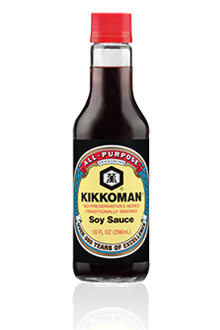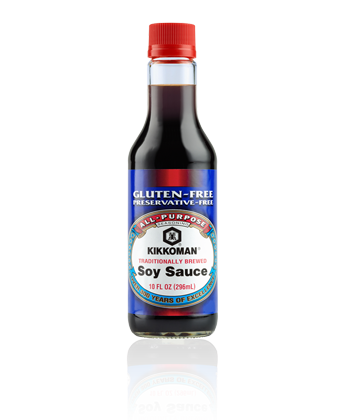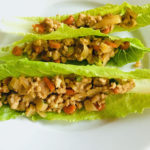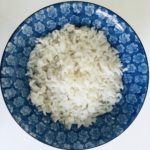
I was in Miami in April and ate at the famous Nobu Japanese restaurant. I told the waiter about my intolerance to gluten, and therefore my inability to eat soy sauce, as it contains wheat. He replied, “We have something for people like you” and produced a letter from Kikkoman soy sauce company that said, in a nutshell, that there are no wheat or soy proteins in their soy sauce that could cause allergic reactions. I sat there, stunned / confused / excited — could it be true? If so, why have I been avoiding soy sauce and therefore Asian restaurants in general for the last 5 years?? Could I actually eat family style with my gluten-eating friends? At that moment I had a decision to make: eat the appetizers my friends had ordered, or eat my own sushi with my wheat-free soy sauce I had stashed in my purse. What would YOU do?
Well, I decided to do it — eat the appetizers, I mean! I ate a few pieces of saucy fish and some salad with a soy sauce dressing. A few minutes later, I had an intense itching in my throat, which I used to have all the time before going gluten-free and which I get sometimes with seasonal allergies. Was this my reaction to the small amount of soy sauce I had consumed? I stopped sharing right then and there and pulled out my soy sauce stash. I felt like a deflated balloon.
Once home I decided that I needed to get to the bottom of this Kikkoman claim, so I sent an email inquiry. Here is the letter that they sent to me (note that it is dated February 4, 2005). I don’t think I will be using the Lazy Susan in any Chinese restaurants anytime soon, but decide for yourself!

UPDATE 1/27/11: Kikkoman has created a new gluten-free soy sauce with rice instead of wheat!
UPDATE 12/16/19: Check out all of their gluten-free products now!







Neurosci says
Kikkoman’s response is absolutely accurate. We can be very poor judges of our body’s actual responses to drugs and diets because our expectations can so strongly alter our perceptions. That’s why the placebo effect tends to run on the order of 30% in most studies.
Dangus says
I trust these claims about as much as I trust McDonald’s assertion that the part of the wheat used in their fries didn’t have glutens in it. I just don’t think companies fully understand in all cases how sensitive this disorder can be. I see many companies now selling products that are 20ppm gluten or less, and saying they are “gluten-free”. Even 8 years ago, when I started this diet, some doctors were saying the safe level is 3ppm or less. Still others claimed there was no safe level at all. Well, in my experience, I get a lot less sick less often when I err on the side of caution.
Valence says
That is complete BS. I have only just recently discovered my problem is a gluten intolerance. I’m not a master at reading labels but I read it and truly thought it would be ok since I heard most soy sauces are ok. I had some last night and woke up miserable from eating rice with a little kikkoman soy sauce. There was nothing else in it. Boiled rice. So what do you think caused my reaction? How could it be a placebo affect if I went into it thinking I was safe? And if wheat is the 2nd main ingredient how can they say there’s no gluten in it? Eeeeeeeeeesh. I hope laws get stricter. If Kikkoman can dance around it, so can others. I’ll never get better unless I just start eating plain rice and potatoes. Yay! Gotta do whatcha gotta do! I don’t think i’ll ever use kikkoman products. i take my health serious even if they don’t.
The only safe level of gluten is 0. I’m still trying to eliminate it but i guess it’s legal to call it “natural flavoring” so… what do we pay the FDA for anyway?
Shirlee says
In Australia the limit for gluten is .02%
Jo says
My guess would be that premium soy sauce, such as Kikomman, process their product in a way that changes the protein in the wheat, so that the end product does not have gluten.
For example: when you cook a piece of red meat, it turns brown, you have changed the proteins and they cannot be changed back (to red again).
John says
Note that the letter refers to their “Japanese-brewed” product, which is different from the USA-made sauce. I’ve written to Kikkoman’s US office asking for clarification.
Doug says
I got the same letter from Kikkoman and fully believe it. Why would they lie about the safety of their product? Seems pretty stupid to me. Plus they didn’t run the study themselves — an independent 3rd party did it.
Quality soy sauce is distilled, just like whiskey and other spirits. Supposedly the distilling process breaks down the gluten and leaves something different behind. The end result is 5ppm or less of gluten. The FDA considers anything less than 20ppm “gluten free”. I know that some people scoff at this, but there needs to be a standard set as no food can be guaranteed 100% gluten-free with no cross contamination. Even before getting to the manufacturing facility, many grains used in “gluten free” food, including corn, are harvested with the same farm implements that harvest barley and wheat, so there will ALWAYS be a small amount of cross-contamination in gluten-free products. That is why the FDA has to set a standard other than 0.
Regardless, I am a Celiac and have been eating Kikkoman soy sauce without any side effects. I am a newly diagnosed Celiac, so maybe I don’t have my brain programmed with the incorrect notion that “soy sauce is made with wheat, therefore soy sauce is bad”…and don’t get a self-induced placebo affect that some of you might get with the level of programming you have. I’m sure if I lived for 8 years in fear of regular soy sauce…and then had some…my brain would fool my body into getting sick too.
Anthony says
Pretty obvious which posters here work for Kikkoman. Anyone who knows any applied kinesiology or motility testing knows that Kikkoman soy sauces test poorly, especially to celiacs.
Chris says
I just checked the bottle of Kikkoman’s in my fridge, and the first ingredient listed after water is “wheat”. I am just suspecting CD, but this is more evidence. Sushi is generally CD safe (rice, fish and veggies) so why is it that my bowels always seem to get into a knot after eating sushi?
Shirlee says
No Anthony, I don’t work for Kikkoman .
I have been a diagnosed Coeliac for 15 years and have been consuming Kikkoman products all that time.
I have regular bowel biopsies, as I consume oats. Which is the recommended requirement by our Coeliac Society.
I came across Kikkoman products all those years back too.
I did have the Australian Government analytical report once.
Kikkoman products test to below the level gluten level of 0.02% by the Elisa test, which is the most accurate way to test the gluten levels in food.
Chris you may have a problem with Sushi, as the seaweed is very high in fibre. Quite often this is a problem with a sensitive gut, because of the fibre content
Shirlee says
By the way…..
It’s the long slow fermentation process that break down the gluten in the wheat.
I am presuming that many of you here don’t use glucose either then, as that to is wheat based.
Again as an end product the gluten is minimal, as it too is broken down.
We are far more knowledgeable here about CD in general as our Coeliac Society is known as hte best in the world. Canada has taken a great deal from us.
Our ingredients book for one
Suzanne says
Two weeks ago I dinned at a local Japanese place here in town called Kyotos. I thought the soy sauce was safe. I ate plain rice and vegtables flavored with Kikoman soy sauce. I was ill and weak for two weeks. Had diarhea for most of the two weeks. I am sure it was the kikoman soy sauce as I had no other products that day that would have done that. so no more kikoman for me.
Jennifer B says
I’m not saying it isn’t possible the soy sauce caused an adverse reaction (I use it sometimes and generally get away with it but I wouldn’t feed it to another celiac) but please keep in mind if you go out for sushi that imitation crab is most often made with wheat flour and/or pure wheat gluten. Very few sushi restaurants in the US use real unadulterated crab meat in their California rolls and other items. Fish roe also often includes wheat, as part of the processing.
So, if you do go out to sushi keep in mind the soy sauce, yes, but also stay away from roe and crab. Nigiri sushi with identifiable types of real fish are a better option.
alison says
Hi Jennifer,
Yes, the fake crab contains gluten — thanks for pointing it out! I am still unsure if roe contains wheat flour or soy sauce.
Tom says
I have reads this debate, other claims that soy sauce is alright from other manufacturers, and the placebo affect. For me, Soy Sauce is the worst culprit except for Tamari that is gluten-free. Be careful, some Tamari is not. Even the smallest amount in any form, causes a fast and immediate reaction. This is not just sensitivity as I have experienced the effects of cross contamination, for example, where I had fresh sweet potatoes fries that were fried in the same oil as wheat flour battered onion rings. This is quite different and although disturbing is not the same as a even a little amount of soy sauce which means an entire afternoon off with extreme stomach distress, fatigue and depression. I am not allergic to soy as I sometimes drink soy milk, and it has no effect.
Vega says
I recently had a similar experience at a thai restaurant. The waiter claimed some people can do soy {sauce}. I didn’t buy it. I told them I categorically do not do soy sauce unless it is specifically wheat free. They said they had wheat free, but they still didn’t swap out the soy sauce in my food and I got the worst glutenation I’ve had in YEARS. I have had some of the WORST responses from gluten in soy sauce. I think Kikoman is being really irresponsible in trying to market their products as gluten free. I don’t think they truly appreciate what the consequences really are. I’d like to think they wouldn’t risk marketing their product in a way that is unsafe, but I certainly don’t trust this at all. My experience thus far has clearly pointed to otherwise.
Judy Price says
I’m a GP who recently went gluten free without being officially tested for celiac disease because I was tired of feeling so sick all of the time (my symptoms matched most others with celiac). Yes, I know, I should get tested, but I don’t want to eat gluten again and feel like I used to – I feel so much better now. Every time I eat something that I find out later has wheat or gluten in it, I start going through the same progression of symptoms that last for a couple of days – same thing every time. Like the time I made a wonderful marinated salmon with rice vinegar and Kikkoman soy sauce (purchased in Canada). It was painful. Never again for me.
Kristian says
I was wondering how one can be sure that there was no bacterial contamination in the sushi eaten. While care is taken, as far as I know, that is still a possibility.
Joy says
May as well add my two cents. I am gluten-intolerant (and was diagnosed as such by a naturopathic doctor). I have not been diagnosed with celiac disease (although it was checked by a medical physician). I’ve been attempting 100% gluten free for over five years.
When I eat gluten – even the smallest crumb! – I experience stomach and digestive reactions almost instantly. Possibly I’ll be up all night, rushing to the bathroom; it’s not fun. But I have not noticed the slightest reaction to soy sauce. or to grain-based alcohol (for example, whisky and scotch).
I still buy wheat-free Tamari and Bragg’s Liquid Aminos for home use. Different people have different levels of tolerance, obviously.
Thanks for posting this letter from Kikkoman and thanks for your interest in this subject. In the past I’ve searched to no avail about this very issue.
jack says
there is a wheat free soy sauce – San-J organic wheat free soy. available at wholefoods.
Joy says
yes I do keep wheat free Tamari in my fridge, but I am thrilled that I can still eat out at Asian places (so far so good!) and use their soy sauce. For some of us, the fermentation process changes the gluten structure sufficiently to not cause a problem. Hence my ability to have a whiskey cocktail or regular restaurant soy sauce. But one speck of wheat and I am sick. Again, we are all a bit different.
By the way be careful of fried potatoes like hash browns. Some of them are packaged with wheat. That was my most recent wake up call. Groan!
Tom says
Let me be plain and simple to my response after reading several of these claims of “placebo effect” less than .02%, and finally soy sauce is a fermented product. Long before, at least a few years, and shortly after suspecting it, I consumed small amounts of soy sauce, and suspected a wide variety of causes for the reaction in the other ingredients in the dish I was consuming. As I eliminated each one, the only remaining ingredient was soy sauce, and it invariably became the culprit, and I did not or do not have any reaction to other soy products on the market now. Finally, I agree with those with similar experiences, the reaction was quick, dramatic, and unmistakable. Therefore, I avoid it at all costs, and in all situations. I advise others to do the same.
Joy says
Tom, I’m sorry that happened to you. As I said in an earlier post, we are all very different. That is why some people are healthy as, for example, vegetarians, and some others need meat. There is a lot of a discrepancies in the lives and tolerances of certain food substances for each of us. This forum is providing a way to let others know what works for us and what doesn’t, but we’re all different!
Dee says
I am 36 years old and have just started my gluten free diet.
After reading all of the posts I just wanted to add that everyone has different body chemistry..therefore everyone can react differently to allergens. For instance..I carry an eppy pen for my Celery Allergy, some people can eat celery cooked but not raw. I used to be able to eat it, then developed a raw allergy then developed a whole allergy including it’s after cooked state.
I have this ridiculous allergy because of the Birch Tree. We are still learning a lot about medicine and the human body. It is not yet an exact science.
Some of us have cross reactions..so where one person would have an allergy or sensitivity to just gluten, there will be some who are allergic to gluten as well as something else that will cross react with any ingredient. Like Soy, etc. Hence, some of us have allergies to soy sauce and some of us don’t.
The one thing we can all agree on is that this is a frustrating way to have to live. We have to do what works for us and try to support each other. Good Luck to you all and good health too.
sue says
Just found out that my niece had a really bad allergic reaction to Kikkoman soy sauce and she is not diagnosed with any known allergies. She is fine with China Lily soy sauce, which the family normally uses, and the only thing they can identify as different in her diet is the Kikkoman soy sauce. About 12 hours after ingestion, her entire body turned a bright and very itchy red with some swelling and required Benadryl every 4 hours to keep the itching under control and the reaction lasted a couple of days.
Maybe there is something else in their soy sauce that people who are sensitive to gluten will react to?
Myself, I just avoid soy sauces and use tamari or go plain.
Alison says
Sue,
Don’t know if you saw my new post that Kikkoman has come out with a truly gluten-free soy sauce.
Joy says
I totally agree with you, Dee. Thanks to everyone for posting…
I’ve always loved Tamari soy sauce, and now you can get Tamari Wheat-Free soy sauce. It’s more expensive of course!
Here’s to your good health…
Holly says
I will never use kikkoman products again. Today, I had a spring roll with kikkoman soy sauce, and it wasn’t 10 minutes later that I started coughing stuff up, and itching all around my nose and mouth. Just a couple weeks ago, I found out that I have a gluten allergy. I have been struggling with food, trying to figure out what I can and cannot eat, and I’ve been doing a lot better the past couple weeks, I finally feel like myself again after almost a year of dealing with horrible allergies. But then, I ate the soy sauce, thinking I would be fine. I really had no idea soy sauce would have (or even might have) gluten. I hadn’t eaten anything else today… Now I am itchy, miserable, and mad.
Alison says
Holly,
There is wheat-free tamari available and Kikkoman now has a gluten-free version. It is frustrating to find gluten in things you never suspected!
Lawrence says
I believe their letter but you do have to take it with a grain of salt. I am not very sensitive to gluten so I suppose I will open myself up to occasionally having some dishes which contain Kikkoman soy sauce. Many other people will simply have to adjust to either avoid these dishes altogether or use a certified gf sauce. No two bottles of Kikkoman will ever be the same and some people may get a reaction based upon different bottles or different amounts of sauce used and even possibly the frquency of use. I am going for an upper endoscopy next month and I will provide my doctors with the letter from the Company and discuss it with them. I doubt that it will be much of an issue for me but I am not sure.
I find it silly for them to claim that their soy sauce is naturally gf and then they come out with a certified gf soy sauce. I think this is being produced to appease those who are very sensitive to their regular soy sauce. It is all about the money. The more people complain the more they will make an overpriced soy sauce that will be mostly for indivdual sale and not wholesale. Resturants will not buy this product because it will not be as cheap and the demand will be low. I bet that in the next few years Asian restaurants will be telling their gf customers that they are using the gf Kikkoman and really using the regular sauce because the company will probably tell the owners that both are essentially gf (one and the same). Results will vary. Sorry to sound cynical but I really think this will happen.
Joy says
Exactly right Lawrence, everything comes down to THE MONEY. The gluten free soy sauce is ridiculously expensive. Not a lot of demand for it, overall.
Joy says
Kudos to those who have this problem and address it in their diet. I know two people (one guy and one gal) who refuse to accept it, even though they were diagnosed with celiac disease. They both look bloated. Keep up the good work. Your health is the most important thing in the world.
Israel says
It sounds like you have a wheat allergy in addition to celiac. Plain old celiac does not tend to cause itching upon exposure to gluten.
Brazil says
I can’t believe it. Not soy sauce!
About three months ago I cut out gluten and have been cooking more at home. I’ve gotten to depend on soy sauce as I’ve been focusing on Asian cooking. I noticed that each time I had something with soy sauce I felt itchy all over and just pain uncomfortable so I decided to Google it and found this site.
The thing is, no matter what the labels say or what the manufacturers say, if you have a reaction, it has gluten. Unfortunately, for some of us, this “test it and see” option leads to some pretty severe reactions. So, yeah, I agree, it’s sad that we can’t trust labels (or manufacturers).
Joy says
The government allows a certain (very small) percentage of gluten in products that claim “Gluten Free”. Some people react to that small percentage of gluten. Keep in mind there are other foods that are common allergens too, soy being one of them.
I have found something to be true with me: The longer I am gluten free, the more sensitive my body becomes to gluten–even the tiniest amount.
Joy says
It’s a curious fact that many people absolutely refuse to accept that gluten is a serious allergy. I think it has to do with fear.
I have two groups of friends who welcome me to Thanksgiving dinners. They never make a fuss of any sort, switching to gluten-free bread stuffing, and thickening the gravy with cornstarch/potato starch. I always make a gluten-free crust pie to go along with the others.
One family member, who I always felt particularly close to, has difficulty veering from his well-established Thanksgiving menu. It’s his Thanksgiving and he certainly has EVERY right to do it his way; I understand that and accept it fully.
But it is an interesting view into the inherent psychology behind this holiday. Thanksgiving dinners and the food served and devoured are archetypal symbols not easily set aside by everyone.
Good luck to everyone this Thanksgiving. One tip: after thickening gravy with cornstarch, whisk in some mashed potatoes to give it the kind of bulk you’d get from a traditional flour-thickening.
Happy thanksgiving!
Angela R says
I am not sure if others are aware of a really wonderful gluten-free soy alternative called Coconut Aminos, but it is what our family uses. http://www.coconutsecret.com/aminos2.html. It can be found at Whole Foods and Trader Joe’s. I use it regularly in place of soy sauce and my family loves it. In interest of full disclosure we are not a family with diagnosed gluten allergies, but I found this product in my search for a soy free and peanut safe alternative for soy sauce. About a year ago I contacted the company and was told this product was safe for people with peanut allergies and thus far my daughter has had no reactions and nor have I (soy allergy.)
Patti F says
I am so glad to have found this site! I have been gluten-free for two weeks; never really had any problem with gluten that I was aware of, except recent saliva tests showed some adrenal hormone stress. My chiropractor, who follows Dr. Kalish (if anyone is familiar), suggested going gluten and dairy free. The trouble began when my husband and I went out for dinner the other night and I ordered a Chinese chicken salad sans the crunchy noodles and wantons, thinking this would be gluten free. I had no symptoms until the next morning with bloody D. Then, that evening I made a stir fry with Trader Joes soy sauce! Today I am suffering with bloating, cramps, brain fog, depression, anxiety, and fatigue. I was never this sensitive to gluten! This is not a placebo effect because I never even would have thought to check the ingredients of soy sauce. But, I am wondering why I am so sensitive to gluten now? Your thoughts would be appreciated!
Jerm says
Patti F,
Did you consumed the normal soya sauce or the gluten free soya sauce? I don’t know which crunchy noodles are you referring to , is it the yellow crunchy noodle? That is made of wheat, wantons wraps too. Many Chinese food contain gluten as their use gluten-soya sauce in everything.
How old are you now? Maybe you didn’t realise you were sensitive to it? I realise this after I got severe bloating and bowel problems after consuming milk and oat every morning. I didn’t get check-up as my parents didn’t want. So I go on this diet myself. I remember I can’t even control myself of going to toilet, my stool is very watery although I feels that there a lot to go, it always comes a little(all that junk stuck inside!). Milk got me bloated and mild diarrhea but oat worsen my bowel problems lots. I stopped that and realised wheat caused me constipation. All this happening, and my parent thought it is normal.
Albert W says
FDA currently proposes labels with Gluten Free should contain less than 20 ppm of gluten. If one has a problem with Kikoman and attributes the cause to gluten, then all the Gluten Free labelled food may not be safe?
Heather says
Joy,
I agree with your statement that everyone is different in what foods they can tolerate. However, no one “needs” meat. The FDA states that a vegetarian or vegan diet is appropriate for all people in all stages of life. There is not one single nutrient in meat that can not be found in vegetarian sources. There are even vegan sources of DHA and EPA available. If you do not feel healthy on a vegetarian diet, it is due to poor planning. Do even the most superficial reading on the subject and you will quickly see that a properly planned vegetarian diet is not only adequate, it is far superior to the standard american diet. A vegetarian diet can prevent a wide range of disease, not to mention being more humane and ecologically sustainable.
Brandi says
and yet they just released a “Gluten Free” soy sauce! If their claim was true, there would be no need for it!
Aseras says
I sippose its worth pointing out that just because the bottles at these establishments say kikkomam on them doesn’t mean they didn’t fill them with a cheaper substitute. I’d be willing to bet real kikkomam is safe but the cheap stuff they can get by the gallon from food services.
There’s a lot of food cheating by cheapening even by name brand companies. It needs to be monitored and the FDA needs to crackdown.
sam says
I agree with last post. Kikkoman is recognized as favorable flavored soy in Japan and you definitely can tell the difference when you taste it. Restaurant does keep the kikkoman bottles on table for this reason and fill with cheaper ones. I’ve done it in a restaurant myself. That being said Im sure everybody reacts differently and eat at their own risk.
Drenna says
I am waiting on blood test to show what food allergies I have. The Doctor suspects, dairy, gluten, maybe more.
Anyway if I am gluten intolerant, I will appreciate knowing to watch out for soy sauce.
And Joy, I keep passing out when I try a vegetarian diet. I even went to see a nutritionist and went directly by what she said and still passed out. The nutritionist said I should not be a vegetarian, and believe me it wasn’t due to lack of planning. I got professional help. Somehow it don’t work for me.
Everyone’s body is different. I am an extreme case. but there are those in some instances that need meat.
CB says
now it’s May 2015 – i still can’t find gluten free japanese soy sauce here in thailand, and all kikkoman’s products here contain wheat.
i miss my sashimi 🙁